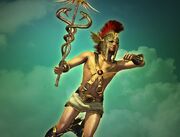| This article's content is marked as Mature The page contains mature content that may include coarse language, sexual references, and/or graphic violent images which may be disturbing to some. Mature pages are recommended for those who are 18 years of age and older. If you are 18 years or older or are comfortable with graphic material, you are free to view this page. Otherwise, you should close this page and view another page. |
| Jafar says: Read my lips and come to grips with the reality! This article is a stub and is in need of expansion. You can help Villains Wiki by expanding it. |

Hermes
Hermes, also known as Mercury in Roman mythology, is the son of Zeus and Maia. In infancy, he stole the twelve cattle of the sun god Apollo out of craving for meat. He even invented the lyre by having killed a tortoise and spun sheep guts, the latter of which he made into strings. While he was rustling Apollo's cattle, he was witnessed by a vineyard worker, and he promised him a lot of fruit if he didn't tell, but whether that promise was just a lie is unknown. He then killed the cattle and burned them, but being a god, he could not eat any; all he could do was savor it. He had invented his winged sandals called talaria to hide his tracks. Being an infant, he pretended to be helpless like a mortal baby, but he did not fool his mother one bit. Hermes and Apollo were on opposite sides over this matter, discussing with Zeus. Hermes lost because, despite being a baby, he had more vocabulary. He had no choice but to lead Apollo to the latter's surviving cattle.
Eventually, Hermes would become the messenger of the gods. Like most Greek gods, he often fell in love with and seduced mortal women, often raping them if they resisted. For example, the Cretan princess Apemosyne attempted to flee when Hermes approached her but was tripped up and was raped by Hermes. She was then killed by her brother Althaemenes, who believed she had lied about the assault. Hermes also bore the half-goat god Pan by raping the nymph Dryope (or Penelopeia depending on the source) while in the form of a goat.



